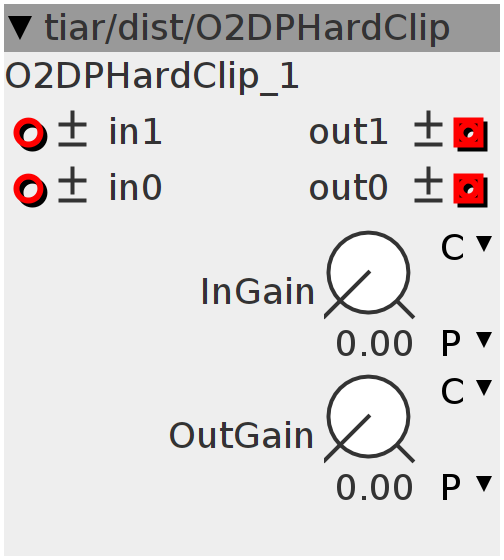O2DPHardClip
HardClip with Differentiated Polynomial Anti aliasing.
Inlets
frac32buffer.bipolar in1
frac32buffer.bipolar in0
Outlets
frac32buffer.bipolar out1
frac32buffer.bipolar out0
Parameters
frac32.u.map InGain
frac32.u.map OutGain
Declaration
float x0, x1, I0, I1, out, inGain, outGain;
int32_t old_in;
int32_t outMax, outMin;
Init
x0 = x1 = I0 = I1 = out = 0;
old_in = 0;
Control Rate
inGain = param_InGain * (1.0f / (1 << 25)) * (1.0f / (1 << 27));
outGain = 2.0f * param_OutGain;
outMax = (int32_t)(outGain);
outMin = -outMax;
Audio Rate
// precedent value of input
x1 = x0;
// current input value (float)
x0 = inlet_in1 * inGain;
// precedent value of Integral
I1 = I0;
// calc of current Integral
// sat(x) = x for |x| < 1
// sat(x) = 1 for x >= 1
// sat(x) = -1 for x <= -1
// Int(sat(x))=
// 0.5*x^2 for |x|<1
// 0.5+x for |x|>=1
I0 = fabs(x0);
if (I0 <= 1) {
I0 = 0.5f * I0 * I0;
} else {
I0 = I0 - 0.5f;
}
// if the precendent and current input are different enough
// we use the differenciation trick (ie mean on the x1 x0 interval
if ((inlet_in1 & 0xFFFFF000) != (old_in & 0xFFFFF000)) {
outlet_out1 = (int32_t)(outGain * (I0 - I1) / (x0 - x1));
} else {
// if the precedent and current values are close, no antialiasing
// is necessary and we avoid a division by a small x0-x1:
// we simply calculate the value of the saturation
outlet_out1 = x0 >= 1 ? outMax : x0 <= -1 ? outMin : (int32_t)(outGain * x0);
}
old_in = inlet_in1;
// precedent value of input
x1 = x0;
// current input value (float)
x0 = inlet_in0 * inGain;
// precedent value of Integral
I1 = I0;
// calc of current Integral
// sat(x) = x for |x| < 1
// sat(x) = 1 for x >= 1
// sat(x) = -1 for x <= -1
// Int(sat(x))=
// 0.5*x^2 for |x|<1
// 0.5+x for |x|>=1
I0 = fabs(x0);
if (I0 <= 1) {
I0 = 0.5f * I0 * I0;
} else {
I0 = I0 - 0.5f;
}
// if the precendent and current input are different enough
// we use the differenciation trick (ie mean on the x1 x0 interval
if ((inlet_in0 & 0xFFFFF000) != (old_in & 0xFFFFF000)) {
outlet_out0 = (int32_t)(outGain * (I0 - I1) / (x0 - x1));
} else {
// if the precedent and current values are close, no antialiasing
// is necessary and we avoid a division by a small x0-x1:
// we simply calculate the value of the saturation
outlet_out0 = x0 >= 1 ? outMax : x0 <= -1 ? outMin : (int32_t)(outGain * x0);
}
old_in = inlet_in0;